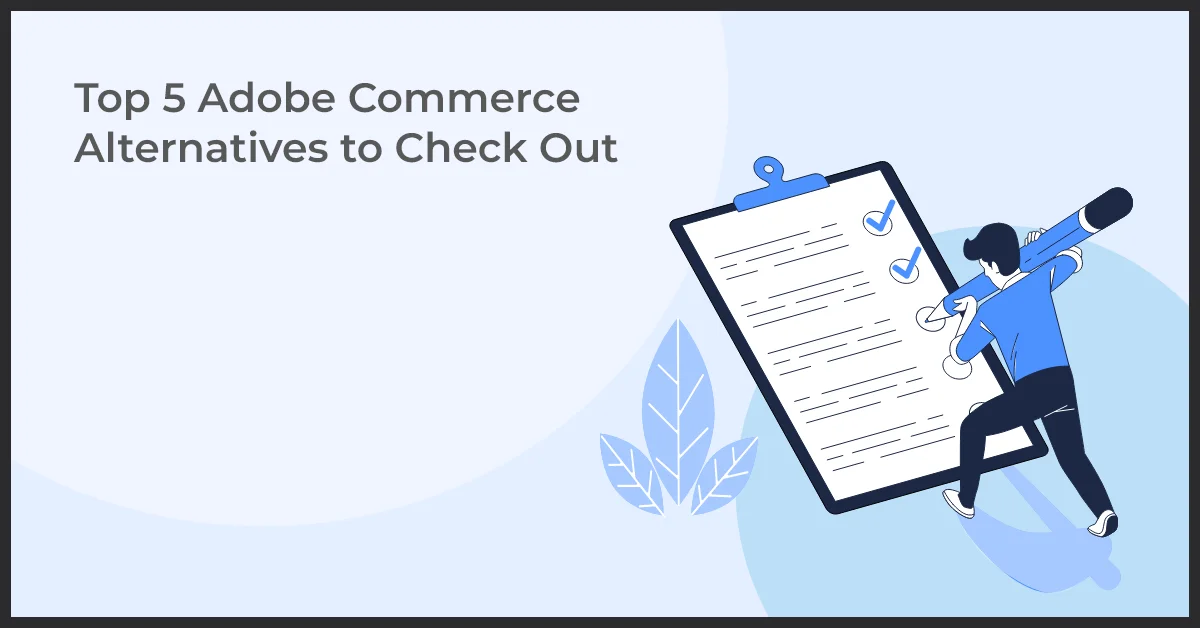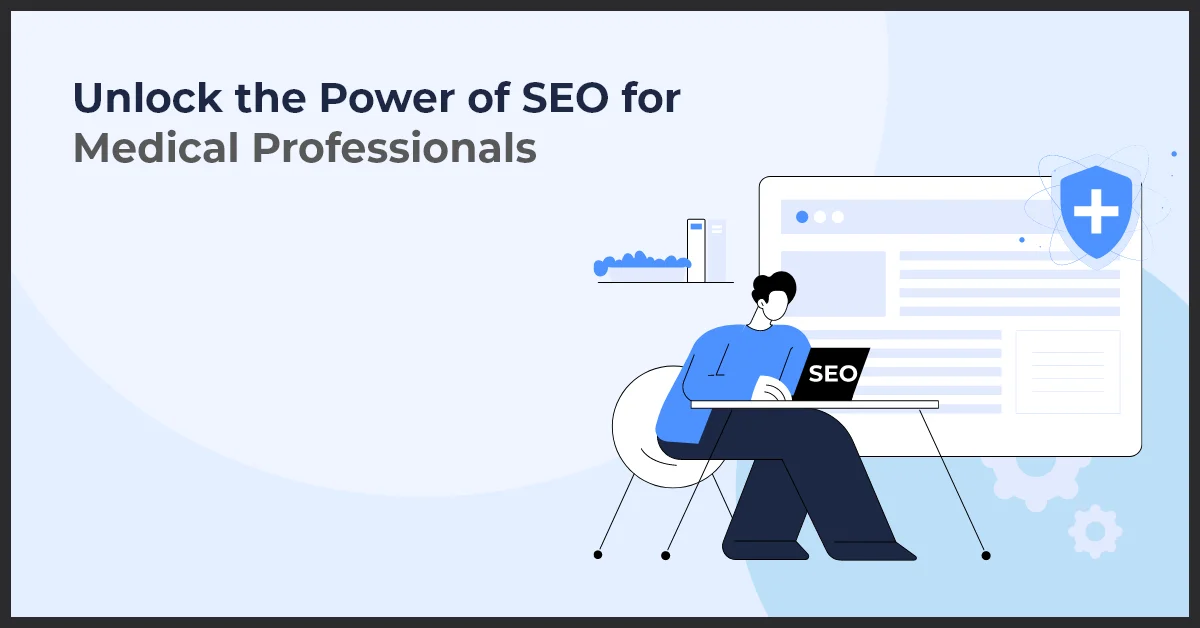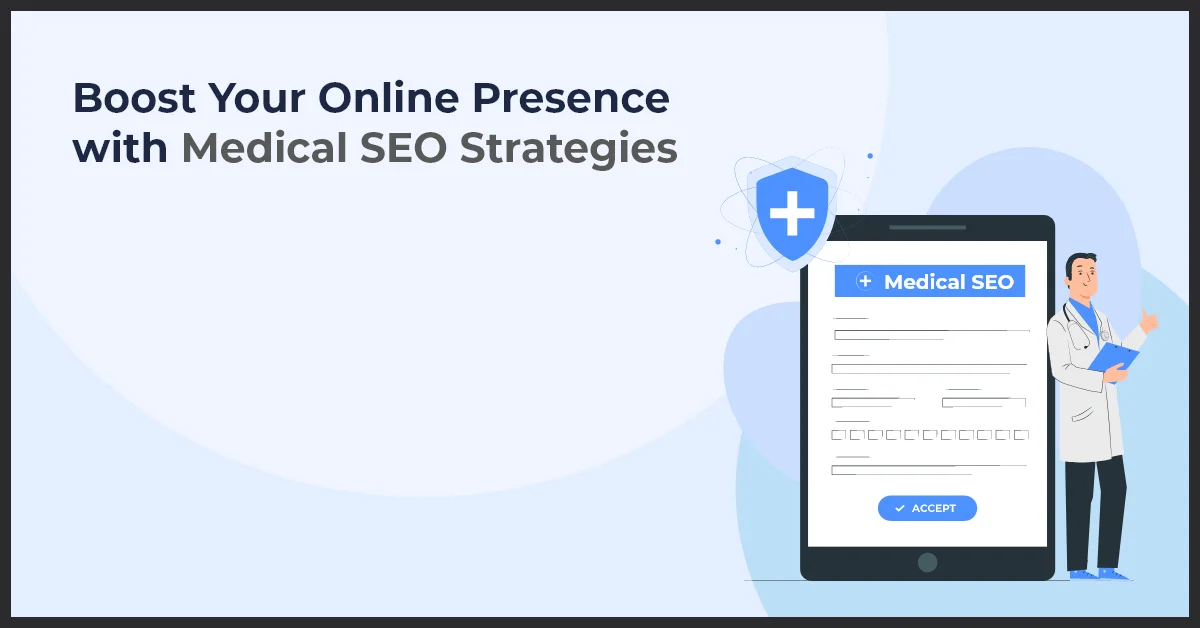Top 5 Adobe Commerce Alternatives to Check Out

Published on: November 17, 2023
Updated on: June 26, 2024
1794 Views
- Digital Marketing
11 min read
Adobe leads the market with its impressive eCommerce solution, Adobe Commerce, helping businesses create stellar B2B and B2C shopping experiences with out-of-the box features.
While Adobe Commerce offers a wide range of features and benefits, it's not always the perfect fit for every business. While this big-budget solution is worth the cost for enterprise level organization, Adobe Commerce alternatives may be a better fit for smaller businesses, particularly those with limited resources or very basic e-commerce needs.
To help you determine what will best meet your needs, we’ll take a closer look at the advantages and disadvantages of Adobe Commerce. This way, you can meaningfully compare Adobe Commerce features with the alternative eCommerce platforms.
So, let’s dive right in!
The Pros and Cons of Adobe Commerce
Like any software, Adobe Commerce comes with its own set of pros and cons. So, let’s take a look at them one by one.
Pros of Adobe Commerce
- Flexibility and Customization: Adobe Commerce is known for its high degree of flexibility. It allows businesses to create highly customized online stores tailored to their specific needs and branding.
- Rich Feature Set: Adobe Commerce offers an extensive list of features out of the box, including product management, order processing, inventory management, and more. It provides tools for both B2B and B2C e-commerce.
- Open-Source Community: The open-source version of Adobe Commerce (formerly Magento Open Source) has a large and active community of developers. This community contributes to a wealth of available extensions, themes, and resources.
- SEO-Friendly: Adobe Commerce is SEO-friendly, making it easier to optimize your online store for search engines. It offers features like SEO-friendly URLs, metadata management, and sitemaps.
- Multi-Store Support: Businesses with multiple brands or international operations can manage multiple stores, websites, and store views from a single admin interface.
- Robust Security: Adobe Commerce places a strong emphasis on security, offering built-in security features and regular security updates to protect your online store and customer data.
Cons of Adobe Commerce
- Complexity: Adobe Commerce can be complex, particularly for beginners. The learning curve may be steep for users with limited technical expertise.
- Cost: The Enterprise version of Adobe Commerce can be costly, with licensing fees, hosting costs, and development expenses. Smaller businesses may find it expensive.
- Resource-Intensive: Building and maintaining an Adobe Commerce store can be resource-intensive, requiring dedicated technical resources and infrastructure.
- Hosting: The platform's performance heavily depends on hosting quality. Businesses must invest in reliable hosting to ensure optimal performance.
- Maintenance: Regular maintenance, including updates, security patches, and troubleshooting, is necessary to keep the store running smoothly.
- Overkill for Small Stores: Adobe Commerce's robustness may be overkill for very small e-commerce operations with simple requirements.
Key Features to Consider in Adobe Commerce Alternatives
When you're on the hunt for an Adobe Commerce alternative, it's essential to evaluate the features that will best align with your business's goals and requirements. Here are some key features to keep at the forefront of your decision-making process:
1. Flexibility and Customization
Look for a platform that offers a high degree of flexibility and customization. Your e-commerce solution should adapt to your unique business needs, allowing you to tailor the customer experience, design, and functionality to your specific requirements.
2. Scalability
Your business may grow, and your e-commerce solution should grow with you. Ensure the platform can handle increased traffic, product offerings, and customer interactions without compromising performance.
3. Robust Integration Capabilities
Find an alternative that seamlessly integrates with popular third-party tools and services, such as payment gateways, CRM systems, and marketing automation platforms. This ensures a cohesive and efficient e-commerce ecosystem.
4. Mobile Responsiveness
With the increasing prevalence of mobile shopping, a mobile-responsive design is non-negotiable. Your chosen platform should prioritize mobile optimization to deliver a smooth and engaging shopping experience for customers on smartphones and tablets.
5. Comprehensive Analytics and Reporting
Access to data-driven insights is crucial for making informed decisions. Look for an alternative that offers robust analytics and reporting features, enabling you to track sales, customer behavior, and other key metrics to optimize your e-commerce strategy continually.
6. Security and Compliance
Protecting customer data and ensuring compliance with industry regulations is paramount. Verify that your chosen platform prioritizes security and offers the necessary compliance features.
7. Support and Documentation
Reliable customer support and thorough documentation can make a significant difference in your experience with an e-commerce platform. Ensure the alternative provides responsive customer support and comprehensive resources to assist you in using the platform effectively.
8. Cost-Effectiveness
Evaluate the total cost of ownership, including licensing fees, development costs, and ongoing maintenance expenses. An alternative should offer a competitive pricing structure that aligns with your budgetary constraints.
Top 5 Adobe Commerce Alternatives That You Should Consider
When exploring Adobe Commerce alternatives, understanding the essence of each option is vital. Let's take a deep dive into these alternatives, gaining a comprehensive view of their features, advantages, and potential limitations:
1. Shopify
Shopify, a highly popular e-commerce platform offers a user-friendly interface, a wide range of customizable templates, and a robust app store. Shopify is known for its scalability and can accommodate businesses of all sizes, from small startups to large enterprises. It provides features like inventory management, payment processing, and a variety of sales channels.
Shopify's hidden strength lies in its extensive app ecosystem, which allows users to expand their store's functionality with ease. Beyond standard e-commerce features, Shopify offers a vast array of specialized apps, enabling businesses to customize their stores according to their specific needs, from subscription models to print-on-demand services.
Key Features
Ease of Use: Shopify is celebrated for its intuitive interface, making it accessible to those with minimal technical knowledge.
Extensive App Store: Its robust app store provides a wealth of extensions and add-ons, allowing you to enhance your store's functionality.
Mobile Responsiveness: Shopify prioritizes mobile-responsive design, ensuring that your site delivers a seamless shopping experience on all devices.
Pros
- User-Friendly: Ideal for e-commerce newcomers.
- Scalability: Suitable for small startups and large enterprises.
- App Ecosystem: Offers a diverse selection of third-party apps to bolster your store's capabilities.
Cons
- Transaction Fees: Some plans come with transaction fees, although these can be mitigated by using Shopify Payments.
- Customization Limits: Extensive customization may require coding skills.
- Monthly Costs: Shopify's pricing plans can accumulate, especially when incorporating advanced features.
2. WooCommerce
WooCommerce is a powerful e-commerce solution that operates as a WordPress plugin. It's favored for its unparalleled flexibility and customization options, making it an excellent choice for those who value complete control over their online stores. WooCommerce is highly customizable and allows you to create a unique online store. It also offers a range of extensions and themes to enhance your e-commerce site.
WooCommerce's open-source nature grants businesses complete control over their online stores. What many don't realize is that this flexibility extends to payment gateways. Businesses can choose from various payment processing options, ensuring cost-effectiveness and tailored solutions for different markets and customer preferences.
Key Features
Flexibility: WooCommerce provides extensive customization options, allowing you to tailor every aspect of your e-commerce site.
Open Source: As an open-source plugin, it offers a vast library of plugins and themes, enabling you to create a unique online presence.
Scalability: It caters to businesses of all sizes, from small startups to established enterprises.
Pros
- Customization: Offers unparalleled control over your e-commerce site's appearance and functionality.
- Cost-Effective: WooCommerce itself is free, with costs primarily associated with hosting and premium extensions.
- Integration with WordPress: Seamlessly integrates with WordPress, making it an excellent fit for existing WordPress users.
Cons
- Technical Proficiency: Setting up and managing WooCommerce may require a higher degree of technical knowledge.
- Hosting Costs: You'll need to budget for hosting, domain, and possibly premium plugins.
- Security Management: Responsibility for securing your site falls on your shoulders.
3. BigCommerce
BigCommerce is a cloud-based e-commerce platform that is well-known for its scalability and robust feature set. It equips businesses with a comprehensive toolkit for efficiently building and managing online stores. This toolkit encompasses a range of valuable features, including marketing tools, SEO optimization capabilities, and seamless integration with various payment gateways.
What often remains under the radar is BigCommerce's exceptional SEO potential. While it caters to larger enterprises seeking scalability, its SEO capabilities can benefit businesses of all sizes. Many users may not realize that BigCommerce provides built-in SEO tools and features that go beyond the basics. These tools empower businesses to optimize product listings, meta tags, and site structures, resulting in improved search engine rankings and a notable boost in organic traffic.
Key Features
Adaptability: BigCommerce is engineered to grow alongside your business, ensuring seamless expansion without disruptions.
Responsive Themes: It offers a diverse selection of mobile-responsive themes to guarantee a smooth shopping experience across various devices.
Robust SEO Tools: BigCommerce provides an array of SEO features to enhance your store's visibility in search engines.
Pros
- Scalability: Grows with your business without causing operational bottlenecks.
- Security: Offers robust security measures, including DDOS protection and secure payment options.
- Cart Abandonment Recovery: Features automated cart abandonment recovery emails to potentially rescue lost sales.
Cons
- Cost: Pricing can be relatively high, which might not be suitable for smaller businesses.
- Limited Free Themes: The selection of free themes is somewhat limited compared to certain other platforms.
- Learning Curve: Beginners might find it slightly more complex to set up and manage compared to Shopify.
4. VTEX
VTEX is a cloud-based e-commerce platform with a distinctive focus on delivering a unified commerce experience. This platform excels in seamlessly integrating online and offline sales channels, offering businesses a unique value proposition in the e-commerce landscape.
While VTEX is particularly well-suited for enterprise-level businesses with complex needs, its hidden gem lies in its order management system. This system allows businesses to efficiently handle and fulfill orders across various sales channels. By centralizing order management, VTEX ensures a consistent and seamless shopping experience for customers, which is often overlooked but essential for businesses striving to deliver exceptional customer service and enhance operational efficiency.
Key Features
Omnichannel Integration: VTEX excels in merging various sales channels, allowing businesses to provide a unified shopping experience.
High Performance: The platform is renowned for its robust performance and reliability, even under heavy traffic loads.
Global Reach: It supports multiple languages and currencies, making it an excellent choice for businesses with international ambitions.
Pros
- Omnichannel Mastery: Perfect for businesses with diverse sales channels, including both online and physical stores.
- High-Performance Standards: Known for its reliability, even under high traffic conditions.
- Global Expansion: Suited for businesses targeting international markets and diverse customer bases.
Cons
- Complexity: VTEX can be complex to set up and manage, often necessitating the involvement of skilled professionals.
- Cost: Pricing may be on the higher end, which might not be suitable for smaller businesses or startups.
- Customization: Extensive customization may demand significant development resources.
5. NetSuite
NetSuite is a comprehensive cloud-based Enterprise Resource Planning (ERP) system that encompasses a wide array of business functions. While its ERP capabilities are well-recognized, NetSuite's hidden strength lies in its integrated e-commerce capabilities, making it a versatile solution for businesses seeking an all-in-one platform.
One uncommon but invaluable aspect of NetSuite is its ability to create B2B portals. This feature enables businesses to establish dedicated online portals for their wholesale or business customers, streamlining ordering processes, managing accounts, and offering tailored pricing structures. This B2B functionality is often overlooked but immensely beneficial for companies operating in both B2C and B2B spaces.
Key Features
Comprehensive Suite: NetSuite offers a wide range of tools, covering e-commerce, customer management, financials, and inventory management.
Extensible: The platform can grow seamlessly with your business, ensuring flexibility as your operations expand.
Customization: Provides robust customization options, allowing you to tailor your e-commerce operations to your specific needs.
Pros
- Integration: Seamlessly integrates e-commerce with other essential business functions, providing a unified view of your operations.
- Scalability: Adapts to your business's growth without causing significant disruptions.
- Advanced Analytics: Offers in-depth reporting and analytics for data-driven decision-making.
Cons
- Complexity: Setting up and configuring NetSuite can be complex, often necessitating professional assistance.
- Cost: Pricing can be on the higher side, which may not be suitable for smaller businesses.
- Learning Curve: It may take time to fully leverage all the features and capabilities offered by the platform.
Conclusion
As you navigate the dynamic e-commerce landscape, remember that the perfect platform is your gateway to success. While Adobe Commerce offers reliability, alternatives like Shopify, WooCommerce, BigCommerce, VTEX, and NetSuite cater to diverse needs. Using any of these platforms, you’ll be able to manage all of your eCommerce store in one place. Selecting the right one for your business will depend on the platform’s full range of capabilities and how they align with your unique business needs and goals.
Ready to Embark on Your E-Commerce Journey With Confidence? Let’s Talk!
If you need personalized guidance and expert insights, our team is here to assist. Just drop us a line at info@growthnatives.com, and we'll be delighted to guide you on your path to e-commerce excellence!



